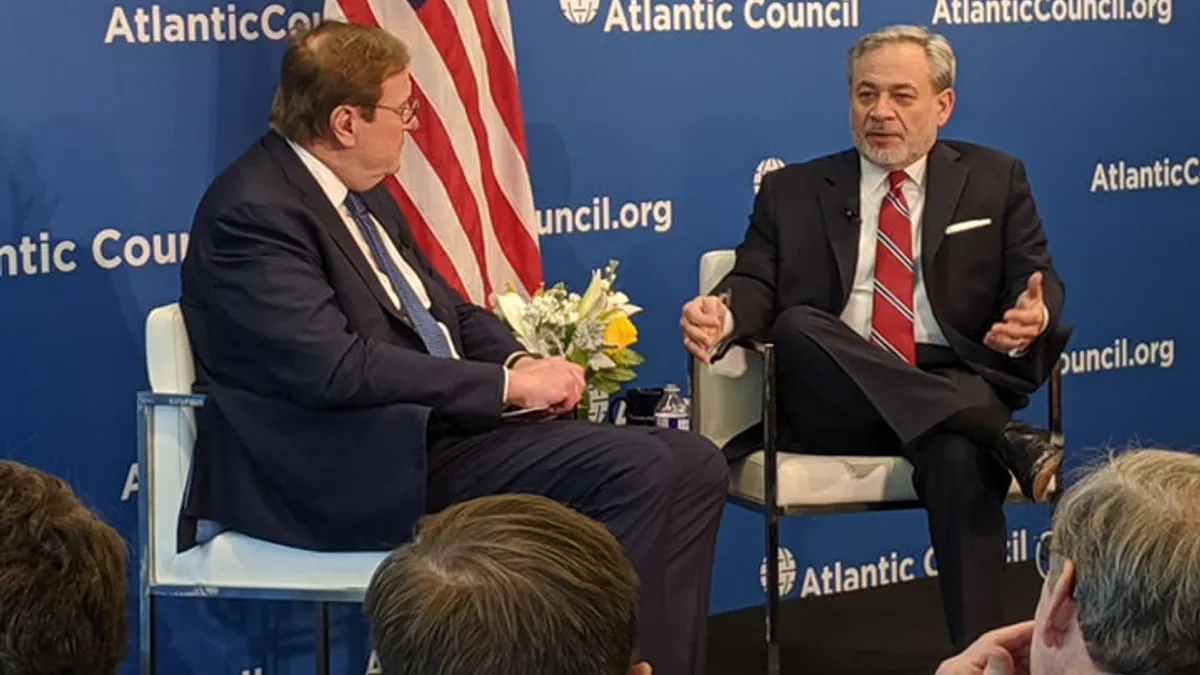Dive Brief:
- Energy Secretary Dan Brouillette announced on Friday up to $64 million of federal funding for coal research as part of the Department of Energy's Coal FIRST initiative kicked off in 2019.
- While the funding for up to 14 projects across seven areas of interest is about half of a DOE announcement on Wednesday for $125.5 million of new funding for advanced solar research, environmental advocates opposing the use of coal were dismayed to see any coal funding announcements.
- "No one's going to argue with the point that coal as a percentage of U.S. electricity generation is declining and will probably continue to decline for some time," Brouillette said during an appearance at the Atlantic Council on Friday. The Department is "looking for more efficient use in [the] electricity generation space, perhaps more exporting opportunities, [and] other uses for coal."
Dive Insight:
Brouillette identified Asia as a key coal exporting opportunity for the United States, outlining to reporters previous discussions with U.S. trade partners to create trade corridors for the resource from landlocked coal-producing states like Wyoming.
While having various pledges to reduce carbon emissions, countries in Asia have continued building out a fleet of coal plants. Japan is planning to build as many as 22 new coal-fired power plants in the next five years, the New York Times reported last week.
However, Western U.S. export efforts have come to a head as Washington, California and Oregon blocked permitting for export facilities, which would support the mining sectors in neighboring states like Idaho and Wyoming.
"We respect the rights of the governors not to [grant permits for export terminals]. Nonetheless, it's not going to prevent the administration from working with our colleagues in Canada and Mexico to look for those types of opportunities," Brouillette told reporters.
Brouillette met with Alberta's premier, Jason Kenney, on Thursday. Among other topics, Kenney tweeted about their discussion of the Keystone XL Pipeline, and Brouillette emphasized to reporters that coal exports were also addressed.
"I think there's a lot of interest in doing this on the part of the Canadians," he said.
Brouillette also sees other fossil fuel export opportunities, having visited an LNG export facility in Baja, Mexico six months ago owned by Sempra Energy.
"They're looking to expand it so we're going to be working closely with our Mexican colleagues to see if we can develop pipeline capacity that may run from the Permian down to facilities like this one in Baja that allow the export of the U.S. gas molecules into Asia much more cheaply," he said.
The U.S. already exports coal through the neighboring countries, but coal companies would rather see the Trump administration chart a path for coal to leave the country through various states, to increase jobs in the industry.
"Certainly we want to see [Canda and Mexico] continue to be available as outlets, but we would also like to see additional capacity in the U.S. that ... generate[s] U.S. jobs," Betsy Monseu, CEO of the American Coal Council, told Utility Dive.
Meanwhile, the continued focus on coal generation receives criticism from environmental groups.
"This funding decision is ridiculous and wasteful," Mary Anne Hitt, senior director of Sierra Club's Beyond Coal campaign, said in an email statement, likening the DOE research focus to "the Pentagon spending $1 billion for new ways to fire a musket ball."
Regarding climate concerns, Brouillette said the coal research is part of an "all of the above strategy," and highlighted the large amounts of renewable and nuclear energy in the U.S. generation mix.
"There are ways to make coal generation more efficient, we're going to continue those efforts. Importantly though, for the coal industry, for coal miners in particular, we're going to look for new uses for coal," Brouillette said.
The new coal research, applauded by Monseu, will be managed by the National Energy Technology Laboratory across several aspects of coal generation, from post-combustion carbon capture, to new modular construction coal plant systems and hybrid models with gas burning units.















